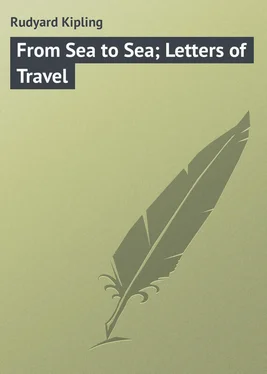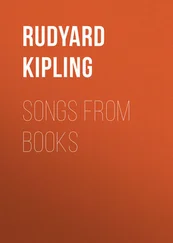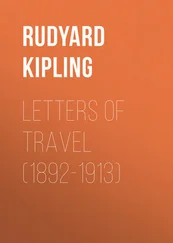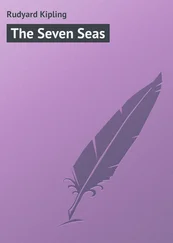Rudyard Kipling - From Sea to Sea; Letters of Travel
Здесь есть возможность читать онлайн «Rudyard Kipling - From Sea to Sea; Letters of Travel» — ознакомительный отрывок электронной книги совершенно бесплатно, а после прочтения отрывка купить полную версию. В некоторых случаях можно слушать аудио, скачать через торрент в формате fb2 и присутствует краткое содержание. Жанр: foreign_prose, foreign_language, на английском языке. Описание произведения, (предисловие) а так же отзывы посетителей доступны на портале библиотеки ЛибКат.
- Название:From Sea to Sea; Letters of Travel
- Автор:
- Жанр:
- Год:неизвестен
- ISBN:нет данных
- Рейтинг книги:5 / 5. Голосов: 1
-
Избранное:Добавить в избранное
- Отзывы:
-
Ваша оценка:
- 100
- 1
- 2
- 3
- 4
- 5
From Sea to Sea; Letters of Travel: краткое содержание, описание и аннотация
Предлагаем к чтению аннотацию, описание, краткое содержание или предисловие (зависит от того, что написал сам автор книги «From Sea to Sea; Letters of Travel»). Если вы не нашли необходимую информацию о книге — напишите в комментариях, мы постараемся отыскать её.
From Sea to Sea; Letters of Travel — читать онлайн ознакомительный отрывок
Ниже представлен текст книги, разбитый по страницам. Система сохранения места последней прочитанной страницы, позволяет с удобством читать онлайн бесплатно книгу «From Sea to Sea; Letters of Travel», без необходимости каждый раз заново искать на чём Вы остановились. Поставьте закладку, и сможете в любой момент перейти на страницу, на которой закончили чтение.
Интервал:
Закладка:
Those in search of a new emotion would do well to run about an apparently empty cantonment, in a disgraceful shooting-tonga, hunting for a place to sleep in. Chaprassis come out of back verandahs, and are rude, and regimental Babus hop off godowns, and are flippant, while in the distance a Sahib looks out of his room, and eyes the dusty forlorn-hope with silent contempt. It should be mentioned that the dust on the Deoli Road not only powders but masks the face and raiment of the passenger.
Next morning Ram Baksh was awake with the dawn, and clamorous to go on to Boondi. "I've sent a pair of horses, big horses, out there and the sais is a fool. Perhaps they will be lost; I want to find them." He dragged his unhappy passenger on the road once more and demanded of all who passed the dak-bungalow which was the way to Boondi. "Observe," said he, "there can be only one road, and if I hit it we are all right, and I'll show you what the tonga can do." "Amen," said the Englishman, devoutly, as the tonga jumped into and out of a larger hole. "Without doubt this is the Boondi Road," said Ram Baksh; "it is so bad."
It has been before said that the Boondi State has no great love for Sahibs. The state of the road proves it. "This," said Ram Baksh, tapping the wheel to see whether the last plunge had smashed a spoke, "is a very good road. You wait till you see what is ahead." And the funeral staggered on – over irrigation cuts, through buffalo wallows, and dried pools stamped with the hundred feet of kine (this, by the way, is the most cruel road of all), up rough banks where the rock ledges peered out of the dust, down steep-cut dips ornamented with large stones, and along two-feet deep ruts of the rains, where the tonga went slantwise even to the verge of upsetting. It was a royal road – a native road – a Raj road of the roughest, and, through all its jolts and bangs and bumps and dips and heaves, the eye of Ram Baksh rolled in its blood-shot socket, seeking for the "big horses" he had so rashly sent into the wilderness. The ponies that had done the last twenty miles into Deoli were nearly used up, and did their best to lie down in the dry beds of nullahs.
A man came by on horseback, his servant walking before with platter and meal-bag. "Have you seen any horses hereabouts?" cried Ram Baksh. "Horses? What the Devil have I to do with your horses? D'you think I've stolen them?" Now this was decidedly a strange answer, and showed the rudeness of the land. An old woman under a tree cried out in a strange tongue and ran away. It was a dream-like experience, this hunting for horses in a wilderness with neither house nor hut nor shed in sight. "If we keep to the road long enough we must find them. Look at the road. This Raj ought to be smitten with bullets." Ram Baksh had been pitched forward nearly on the off-pony's rump, and was in a very bad temper indeed. The funeral found a house – a house walled with thorns – and near by were two big horses, thirteen-two if an inch, and harnessed quite regardless of expense.
Everything was repacked and rebound with triple ropes, and the Sahib was provided with an extra cushion; but he had reached a sort of dreamsome Nirvana, having several times bitten his tongue through, cut his boot against the wheel-edge, and twisted his legs into a true-lovers'-knot. There was no further sense of suffering in him. He was even beginning to enjoy himself faintly and by gasps. The road struck boldly into hills with all their teeth on edge, that is to say, their strata breaking across the road in little ripples. The effect of this was amazing. The tonga skipped merrily as a young fawn, from ridge to ridge. It shivered, it palpitated, it shook, it slid, it hopped, it waltzed, it ricochetted, it bounded like a kangaroo, it blundered like a sledge, it swayed like a top-heavy coach on a down-grade, it "kicked" like a badly coupled railway carriage, it squelched like a country-cart, it squeaked in its torment, and lastly, it essayed to plough up the ground with its nose. After three hours of this performance, it struck a tiny little ford, set between steeply sloping banks of white dust, where the water was clear brown and full of fish. And here a blissful halt was called under the shadow of the high bank of a tobacco field.
Would you taste one of the real pleasures of Life? Go through severe acrobatic exercises in and about a tonga for four hours; then, having eaten and drank till you can no more, sprawl in the cool of a nullah bed with your head among the green tobacco, and your mind adrift with the one little cloud in a royally blue sky. Earth has nothing more to offer her children than this deep delight of animal well-being. There were butterflies in the tobacco – six different kinds, and a little rat came out and drank at the ford. To him succeeded the flight into Egypt. The white banks of the ford framed the picture perfectly – the Mother in blue, on a great white donkey, holding the Child in her arms, and Joseph walking beside, his hand upon the donkey's withers. By all the laws of the East, Joseph should have been riding and the Mother walking. This was an exception decreed for the Englishman's special benefit. It was very warm and very pleasant, and, somehow, the passers by the ford grew indistinct, and the nullah became a big English garden, with a cuckoo singing far down in the orchard, among the apple-blossoms. The cuckoo started the dream. He was the only real thing in it, for on waking the garden slipped back into the water, but the cuckoo remained and called and called for all the world as though he had been a veritable English cuckoo. "Cuckoo – cuckoo – cuck;" then a pause and renewal of the cry from another quarter of the horizon. After that the ford became distasteful, so the procession was driven forward and in time plunged into what must have been a big city once, but the only inhabitants were oil-men. There were abundance of tombs here, and one carried a life-like carving in high relief of a man on horseback spearing a foot-soldier. Hard by this place the road or rut turned by great gardens, very cool and pleasant, full of tombs and black-faced monkeys who quarrelled among the tombs, and shut in from the sun by gigantic banians and mango trees. Under the trees and behind the walls, priests sat singing; and the Englishman would have inquired into what strange place he had fallen, but the men did not understand him.
Ganesh is a mean little God of circumscribed powers. He was dreaming, with a red and flushed face, under a banian tree; and the Englishman gave him four annas to arrange matters comfortably at Boondi. His priest took the four annas, but Ganesh did nothing whatever, as shall be shown later. His only excuse is that his trunk was a good deal worn, and he would have been better for some more silver leaf, but that was no fault of the Englishman.
Beyond the dead city was a jhil, full of snipe and duck, winding in and out of the hills; and beyond the jhil, hidden altogether among the hills, was Boondi. The nearer to the city the viler grew the road and the more overwhelming the curiosity of the inhabitants. But what befel at Boondi must be reserved for another chapter.
XVI
THE COMEDY OF ERRORS AND THE EXPLOITATION OF BOONDI. THE CASTAWAY OF THE DISPENSARY AND THE CHILDREN OF THE SCHOOLS. A CONSIDERATION OF THE SHIELDS OF RAJASTHAN AND OTHER TRIFLES.
It is high time that a new treaty were made with Maha Rao Raja Ram Singh, Bahadur, Raja of Boondi. He keeps the third article of the old one too faithfully, which says that he "shall not enter into negotiations with any one without the consent of the British Government." He does not negotiate at all. Arrived at Boondi Gate, the Englishman asked where he might lay his head for the night, and the Quarter Guard with one accord said: "The Sukh Mahal, which is beyond the city," and the tonga went thither through the length of the town till it arrived at a pavilion on a lake – a place of two turrets connected by an open colonnade. The "house" was open to the winds of heaven and the pigeons of the Raj; but the latter had polluted more than the first could purify. A snowy-bearded chowkidar crawled out of a place of tombs, which he seemed to share with some monkeys, and threw himself into Anglo-Saxon attitudes. He was a great deal worse than Ram Baksh, for he said that all the Officer Sahibs of Deoli came to the Sukh Mahal for shikar and – never went away again, so pleased were they. The Sahib had brought the Honour of his Presence, and he was a very old man, and without a written permit could do nothing. Then he fell deeply asleep without warning; and there was a pause, of one hour only, which the Englishman spent in seeing the lake. It, like the jhils on the road, wound in and out among the hills, and, on the bund side, was bounded by a hill of black rock crowned with a chhatri of grey stone. Below the bund was a garden as fair as eye could wish, and the shores of the lake were dotted with little temples. Given a habitable house, – a mere dak-bungalow, – it would be a delightful spot to rest in. Warned by some bitter experiences in the past, the Englishman knew that he was in for the demi-semi-royal or embarrassing reception, when a man, being the unwelcome guest of a paternal State, is neither allowed to pay his way and make himself comfortable, nor is he willingly entertained. When he saw a one-eyed munshi (clerk), he felt certain that Ganesh had turned upon him at last. The munshi demanded and received the purwana , or written permit. Then he sat down and questioned the traveller exhaustively as to his character and profession. Having thoroughly satisfied himself that the visitor was in no way connected with the Government or the "Agenty Sahib Bahadur," he took no further thought of the matter and the day began to draw in upon a grassy bund, an open-work pavilion, and a disconsolate tonga.
Читать дальшеИнтервал:
Закладка:
Похожие книги на «From Sea to Sea; Letters of Travel»
Представляем Вашему вниманию похожие книги на «From Sea to Sea; Letters of Travel» списком для выбора. Мы отобрали схожую по названию и смыслу литературу в надежде предоставить читателям больше вариантов отыскать новые, интересные, ещё непрочитанные произведения.
Обсуждение, отзывы о книге «From Sea to Sea; Letters of Travel» и просто собственные мнения читателей. Оставьте ваши комментарии, напишите, что Вы думаете о произведении, его смысле или главных героях. Укажите что конкретно понравилось, а что нет, и почему Вы так считаете.












